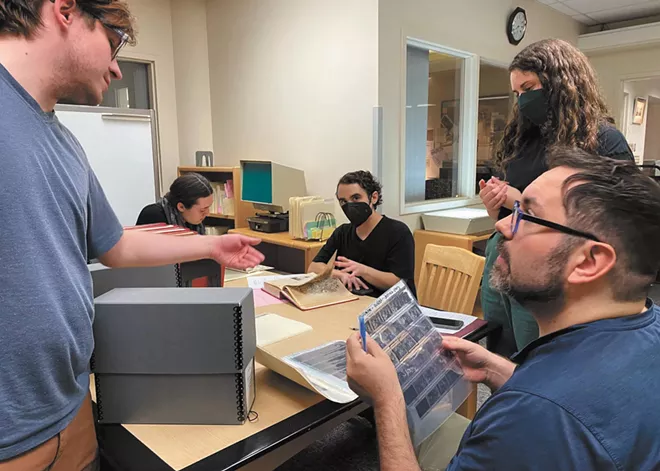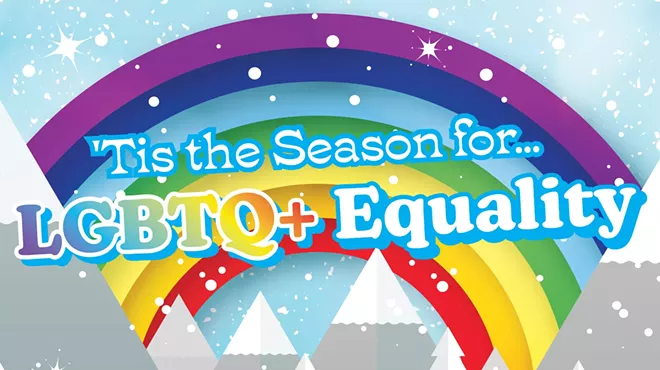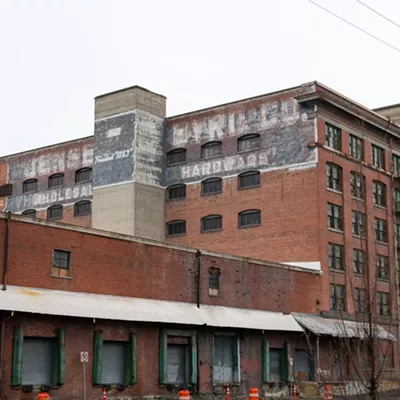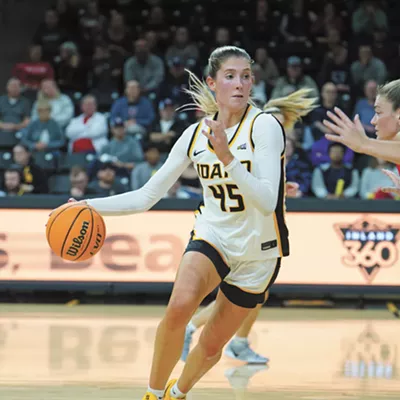If you lined up the historical archives at Washington State University side by side, they would stretch for three miles. Of those thousands upon thousands of documents, just 2.5 feet contain LGBTQ+ content.
"I think it's really important that we can see that queer people have always been here, whether that's in rural areas or elsewhere," says Josie Cohen-Rodriguez, who helps curate the archive, which includes queer comics, letters and pamphlets that support — and condemn — past LGBTQ+ rights movements..
As co-leaders of the WSU Queer Archives Initiative, Lotus Norton-Wisla and Cohen-Rodriquez are on a hunt to locate items in WSU's vast archives to preserve the past and look toward representing the community in the future.
Since the first archive showcase in fall 2022, dozens of items have been found, researched and recorded.
Stacked in filing cabinets by the thousands, items in WSU's Manuscripts, Archives and Special Collections (MASC) are complex pieces of history tucked away in the Terrell Library. With the addition of WSU's LGBTQ+ Center archives, the range of queer history that is preserved ranges wildly: from scrapbooks of old student organizations to a student community-made cookbook from 2008-09.
"One of my favorite pieces here is actually a documentary — it's a VHS tape that we have," says Cohen-Rodriguez. "[The documentary] is not afraid to be proudly queer."
Created by a WSU student-athlete in the late 1990s, the VHS tape goes through the student's and their friends' experiences of queerness at the university and in rural Eastern Washington. Although the documentary is still being processed by the archives for consent from the original creator, the impact of visual records of queerness in the late '90s is undeniably impactful.
"It's very loud, unapologetic and boldly queer," says Cohen-Rodriguez. "That was really inspiring to see that in a film from the late '90s."
As the initiative continues to evolve and excavate old and new archives, Cohen-Rodriguez says that the project has received solid support from the university administration and that she has never seen so many people interested in history.
Now, a little over a year into its endeavors, the initiative has gotten more help to look over information and sift through library archives through two grants.
The first grant was through the WSU Transformational Change Initiative to support "innovative ideas that address issues of inclusion, diversity, equity and access," according to the university. The $4,900 in grant money was used to fund a research trip to various queer archives in the Pacific Northwest, and hire student interns.
The second grant the initiative received — for about $15,000 — was the Washington Digital Heritage Grant, provided through the Washington State Library. The Queer Archive Initiative used the grant funds to extend paid student internships for digitization of existing collections, conducting oral history interviews, and planning for a spring showcase, as well as share its findings in workshops and conferences. This grant funding lasts through July 2024.
"Before it was a paid position, it was just a bunch of passionate people from the LGBTQ+ center who had time to spare searching through the archived materials we could find," says Hunter Kearns, the archive's undergraduate student intern.
Kearns and Drew Gamboa, a doctoral student in history also interning at the archives, work collaboratively at MASC with Norton-Wisla, and in the LGBTQ+ center with Cohen-Rodriguez, uncovering nearly forgotten records and archives.
"There is a lot of cool stuff that you can just find searching through the archives," Kearns says. "Getting the finding aid and then walking down there, pulling the box and seeing something that you really wouldn't expect to see in a rural area."
With the new help, Norton-Wisla and Cohen-Rodriquez can better dedicate their time to analyzing archives, researching past trends and looking toward the future of queer archive preservation.
Over the summer, members of the initiative took a research trip to look at other university archives at the University of Oregon and Oregon State University, as well as Portland's Gay and Lesbian Archives of the Pacific Northwest.
In Portland, the team found documents about organizations and protests advocating for awareness about how things were dealt with during the AIDS epidemic in Oregon.
In Eugene, a longtime haven for lesbian and queer folks, the University of Oregon's queer archive helped set a foundation for future preservation and research for researchers at WSU.
"We were able to meet archivists and curators, as well as research [UO's] collection," says Norton-Wisla. "[We were able to] understand things from their experience and knowledge about the community outreach aspect."
While WSU's initiative continues to move forward and bridge gaps in the collection, the archives are available for the community to explore. Additionally, viewings of the archival material are presented at events each semester to discuss findings with the Inland Northwest community. The next event held by the Queering the Archives initiative will be in spring 2024.
"Learning the history of [WSU's] student leaders and people who have created what's here today, whether that's LGBTQ+ or student orgs, is really important history," says Cohen-Rodriguez. "It can inspire and give examples for people to take into the future." ♦

























